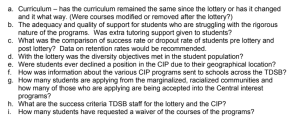MOTION PASSED BY CONSENSUS 21 October 2025 – CSCM.14.10.25 Recommendations Relating to Policy 100: Central Lottery Admissions
This motion is made to the TDSB Director, Supervisor, and Minister of Education to broadly re-commit the TDSB policy review process to prioritize the use of an open consultation process informed by transparent, data-driven metrics, and to further consider educational best practices to achieve greater equity and accessibility in special interest programs. Accordingly, we further propose the development of:
1) More guided pathways to special interest programs,
2) More ‘high-touch’ strategies to ensure that children from target populations receive personal recruitment and application support, and
3) Plans to expand the TDSB’s most successful special interest programs to other campuses.
RECOMMENDATIONS
The Consultations and Communications WG has held significant concerns about transparency, process, and overall decision-making among senior TDSB staff prior to the provincial takeover of the board last June. We continue to have these concerns under supervision. A lack of transparency was evident in the recent handling of the P100 consultation process, both for the glaring lack of relevant supporting data provided by the board, as well as its abrupt cancellation without any communication to parents.
In anticipation of the scheduled P100 policy review which began earlier this year, the Consultation WG recommended that the specific data be provided to support the TDSB’s claim that the central lottery has improved racial equity and minority representation in special interest schools, among other points. None of our requested information has been made public to our knowledge.
At the same time, parent co-reps whose children attend special interest schools report that this revised policy has caused damage to their schools in various ways, namely by increasing attrition rates and ultimately decreasing program quality. It is important to note that these concerns are not the result of increased diversity and equity in enhanced programs but rather appear to arise from the dismantling of program expectations altogether.
The term that staff has used for this low-expectation strategy is “no barriers.” We have had difficulty finding educational research to support the benefits of a no barriers approach or even to describe the documented use of a no barriers approach by other school jurisdictions at all. If any such literature exists it should be made public, especially given the last P100 consultation cycle was marred by fraudulent research. The apparent lack of care in adhering to established best practices is made doubly concerning by the lack of mechanisms to ensure that families are aware of policy review periods, and that feedback presented during consultation will be taken seriously.
Moreover, while the implementation of the P100 consultation and policy review process has been deeply flawed in the past, we do not agree with the TDSB’s recent decision to prematurely close the consultation process.
Rather than a cancelled process, we would have preferred to see an open public consultation process informed by:
- Enrollment data, before and after lottery implementation, made public with the goal of impartially supporting or refuting the claim that the central lottery, as implemented, has improved access to special interest programs by minority groups. We also reiterate that we would like the data requested by PIAC on April 1st be released.
- Vetted strategies with verifiable academic sources, including zero tolerance (e.g., lifetime ban) for researchers who present hallucinated sources. By our own investigation, and in absence of reliable information from the board staff, we would like to propose the following strategies to increase target minority group populations in specialized schools:
- More Guided Pathways – Rather than abolishing all standards for entry, there should instead be multiple ways that a student can enter an applicant pool for specialized programs. Known as a guided pathways strategy, this approach focuses on establishing, in a targeted way, junior special interest programs or even extracurricular clubs at the elementary level to act as reliable feeders into special interest programs in middle and high school. These pathways could include an automatic invitation to apply for successful participants in the junior program; or to all students who achieve certain benchmarks in relevant courses, exams; or by universal screening. Furthermore, guided pathways could be implemented alongside a priority lottery system to ensure that programs are drawn only from a pool of qualified applicants, as compared to the status quo “no barriers” approach which omits any kind of vetting at all.
- More “High-Touch” Strategies – “High touch” means deploying more caring adults throughout the recruitment process to systematize personal interventions. This ensures that students are affirmed and nurtured within their special interest, that they and their family are aware of relevant special interest schools, and that they have adequate support to complete the application process.
- Modeling Desirable Programs – Desirable programs within the TDSB should be treated as models for new schools and campus reorganizations so that students from all areas and backgrounds who have strong interest and/or aptitude can have a realistic (i.e., administratively and geographically) chance at obtaining a spot and ultimately attending a special interest program. Furthermore, having multiple, popular programs across the system would allow for “local norming“, in the case that benchmark scores or marks are required for entry into more rigorously academic programs, thereby increasing equitable access.
The above recommendations in relation to P100 also reflect our recommendations to the board and Ministry of Education more broadly. That is, we recommend that the TDSB and the Ministry re-commit broadly to data-driven decision-making, adherence to established educational best practices, and the deployment of resources to ensure the presence of more caring adults, adequately empowered to provide high-quality support to students at school.
FINANCIAL IMPACT
The recommendations in this report have undetermined financial impact to the long-term governance of the TDSB, but no direct impact to the administration of PIAC.
HISTORY
On March 6, 2025, the Consultations WG report detailed the following recommended questions in relation to P100, to ensure that parents and staff had enough information by which to engage in a policy review:
The full Consultation WG report was presented in the April 1st General Member meeting and follows in Appendix.
COMMENTS
This recommendation supports student achievement in accordance with the mandate of the parent involvement committee under Reg 612/00.
SPONSORS & Co-SPONSORS
Sponsor: Katrina Matheson, (Co-Rep Ward 10)
Co-sponsors: Nicole Di Wu (Co-Rep Ward 12), Susan Lee (Co-Rep Ward 12)
Appendices
